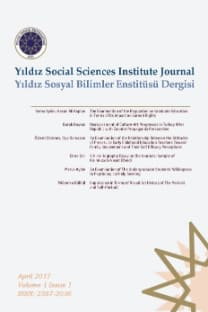Güneş Ülkesi’nin Klasik Yönetim Teorisi Çerçevesinde İncelenmesi
Tommaso Campanella’nın en önemli eseri kabul edilen, 1602 tarihli Güneş Ülkesi, döneminin bilimsel tartışmalarının etkisiyle şekillenmiş bir eserdir. Kitabın bilimsellik odağı Klasik Yönetim Teorisinin de temel yapı taşını oluşturmaktadır. Eser ile Klasik Yönetim Teorisinin bir diğer ortaklaştığı nokta ise değişime gebe olan kendi dönemlerinin gereksinimlerine cevap vermek için ortaya çıkmalarıdır. Klasik Teorideki üretimde verimliliğin sağlanması hedefi, Güneş Ülkesi’nde sistemin devam ettirilmesi yönünde şekil değiştirmiştir. Bu kapsamda, hedeflere ulaşmak için izlenen yollarda birtakım benzerliklere ulaşılmıştır. Bu benzerlikler kitap incelemesi kapsamında, bilginin oluşturulması ve iletilmesi; uygulamalarda ön plana çıkan basitlik ve standardizasyon kavramları; kitaptaki topluluğun ve Klasik Yönetim Teorisinde işçilerin ortak faydayı gözetme yönündeki yönlendirilmeleri ve son olarak yönetici profilinden beklenen özellikler temaları ile ele alınmıştır.
Anahtar Kelimeler:
Tomasso Campanella, Güneş Ülkesi, Klasik Yönetim Teorisi, Henry Fayol, Frederic Taylor
Review of the City of the Sun from the Point of Classical Management Theory
The City of the Sun, first published in 1602 and considered the most substantial work of its author Tomasso Campanella, is a writing that is shaped by the scientific dabates of the era. The focus on being scientific, which is cultivated throughout Campanella’s work, is also the building block of the Classical Management Theory. Another point where the book and the Classical Management Theory align is that both emerged to respond to the needs of their times, which were ripe for evolution. Classical Theory’s objective of achieving productivity takes the form of sustaining the system in the City of the Sun. Thus, some parallels appear in their ways to achieve the ends. This book review discusses the mentioned similarities within several themes, namely, production and transmission of knowledge, prominence of simplicity and standardization, guiding the agents –the community in the book and laborers in the Classical Management Theory- towards common interest and, lastly, the expectations regarding executive branch.
Keywords:
Tomasso Campanella, the City of the Sun, Classical Management Theory, Henry Fayol, Frederic Taylor,
___
- Alexander, D. (2010). 21. Yüzyılda Din ve Bilim: Matris’i Yeniden Oluşturmak. Retrieved 18 November 2021, from https://books.google.com/books/about/21_Y%C3%BCzy%C4%B1lda_Din_ve_Bilim.html?id=dcWxDgAAQBAJ
- Blake, A. & Moseley, J. (2010). One Hundred Years After the Principles of Scientific Management: Frederick Taylor's Life and Impact on The Field of Human Performance Technology. Performance Improvement, 49(4), 27-34. doi: 10.1002/pfi.20141
- Campanella, T. (2019). Güneş Ülkesi (V. Atayman, Çev.). İstanbul: Ayrıntı Yayınları (Orijinal eserin basım tarihi 1602).
- Ernst, Germana & Jean-Paul De Lucca, "Tommaso Campanella", The Stanford Encyclopedia of Philosophy (Summer 2021 Edition), Edward N. Zalta (ed.), from https://plato.stanford.edu/archives/sum2021/entries/campanella/
- Fayol, H. (2021). Genel ve Endüstriyel Yönetim (M. A. Çolakoğlu, Çev.). Ankara: Adres Yayınları, 6. Baskı, (Orijinal eserin basım tarihi 1916).
- Hall, P. A. (1993). The Appreciation of Technology in Campanella’s “The City of the Sun.” Technology and Culture, 34(3), 613–628. doi: 10.2307/3106706
- Kurtyılmaz, D. (2014). Ütopyalar ve Karşı-Ütopyalar Bağlamında Modern Felsefi Düşünce ve Eleştirisi (Yüksek Lisans Tezi, Uludağ Üniversitesi).
- Maggi, A. (2010). Tommaso Campanella’s Philosophy and the Birth of Modern Science. Modern Philology, 107(3), 475–492. doi: 10.1086/651179
- Nişancı, Z. N. (2015). Geçmişten Günümüze Yönetim Düşüncesi. Yönetim Bilimleri Dergisi, 13 (25), 257-294.
- Teokrasi. (t.y.). Türk Dil Kurumu Güncel Türkçe Sözlük içinde. Erişim adresi: www.tdk.com.tr. Erişim Tarihi: 23/12/2021.
- Wren, D. A. & Bedeian, A. G. (2009). The Evolution of Management Thought. Hoboken, N.J: Wiley.
- Başlangıç: 2016
- Yayıncı: Yıldız Teknik Üniversitesi
Sayıdaki Diğer Makaleler
Duygusal Zekâ ve Girişimcilik Niyeti Arasında Öz Yeterliliğin Aracılık İlişkisi
Sanatın Nesnesinden İmgenin Üreticisi Olma Bağlamında Sanat Tarihinde Kadın Olgusu
Film Afişlerinin Görsel Okuryazarlık Açısından Analiz Edilmesi
Güneş Ülkesi’nin Klasik Yönetim Teorisi Çerçevesinde İncelenmesi
